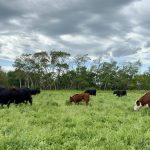Hopes that the U.S. farm bill will quash country-of-origin labelling could be dashed as a fractious Congress and White House wage war over unrelated issues.
The most recent version of COOL went into effect Nov. 23. It is stricter than the version that Canada and Mexico challenged at the World Trade Organization last year, making it a bigger headache for Canadian and Mexican livestock producers, who stand to lose more than $1 billion a year in trade.
Urban politicians argue that the legislation protects consumers’ right to know where their food comes from, but the chief lobbyist for the National Cattlemen’s Beef Association said most people do not know it exists.
Read Also

Rented farmland jumps 3.4 million acres in Saskatchewan and Alberta
Farmland rented or leased in the two provinces went from 25.7 million acres in 2011 to 29.1 million in 2021, says Census of Agriculture data.
“Our consumers don’t care,” Colin Woodall told the November Canfax forum held in Calgary.
Private branded products might carry the country-of-origin label, but few actually notice or seek it out.
Surveys have found people are drawn to the price and appearance of meat, whether it is beef, pork or chicken.
“There is all this trouble over this cruddy little label,” he said.
Woodall said defending consumers’ right to know is not a sound argument because it does not apply to food service, restaurant or further processing, so half the meat is exempt.
Meanwhile, Congress is hashing through a new farm bill worth $500 billion. A major road block between Democrats and the Tea Party influenced Republicans is how much to cut from the food stamp program. The Democrats want to cut $4 billion while the Republicans are pushing for up to $40 billion.
The farm bill could die and changes to COOL lost if they can’t agree on cuts to the program.
In addition, 2014 is an important mid-term election year, in which one-third of the Senate could be replaced. As a result, not much business will be done in the coming year.
Consequently, COOL will end up before the WTO next year as Canada and Mexico protest the latest version.
“We will lose again,” said Woodall.
Canada’s next move is retaliatory duties on a long list of American products ranging from livestock to office furniture.
“If nothing else changes, we as the U.S. industry expect retaliation to take place in the fall of 2014. We think it will be absolutely devastating to us,” he said.
“We are costing ourselves to have this government run program… It has put us in a trade war with our two most valuable trading partners.”
Mexico has not indicated it will issue tariffs in retaliation.
The issue is also going back to court Jan. 9 to appeal a decision that rejected an injunction against the law. A consortium of the NCBA, American Meat Association and Canadian livestock groups are funding the case.
Woodall said a proposed compromise to label meat as product of North America is not a good one.
It would still be a mandatory government run program and does not offer marketing advantages.
“We don’t want a North American label. We want to kill it,” he said.
From the Canadian side, feedlot owner Rick Paskal voiced the frustrations of those who have worked with this law since 2008.
Weather disasters and the BSE trade embargo hit the Canadian industry hard in the last 10 years, he told Woodall. COOL has created another disaster.
“Last week, a 700 pound feeder steer sold for $150 to $175 less in Canada than what it sold for in North Dakota,” he said.
“How do I as a feedlot operator compete against that? We can’t compete, and our ability to do business in a NAFTA (North American Free Trade Agreement) and WTO environment that we have is impossible. My interpretation is that the Americans have no respect for NAFTA or the WTO, and there is little that I or we can do.”
He said the NCBA and other groups did a poor job opposing COOL from the beginning, showing little respect for the livestock industries outside U.S. boundaries.
“It is not only a business in the United States, it is a business in Canada, too,” he said.















